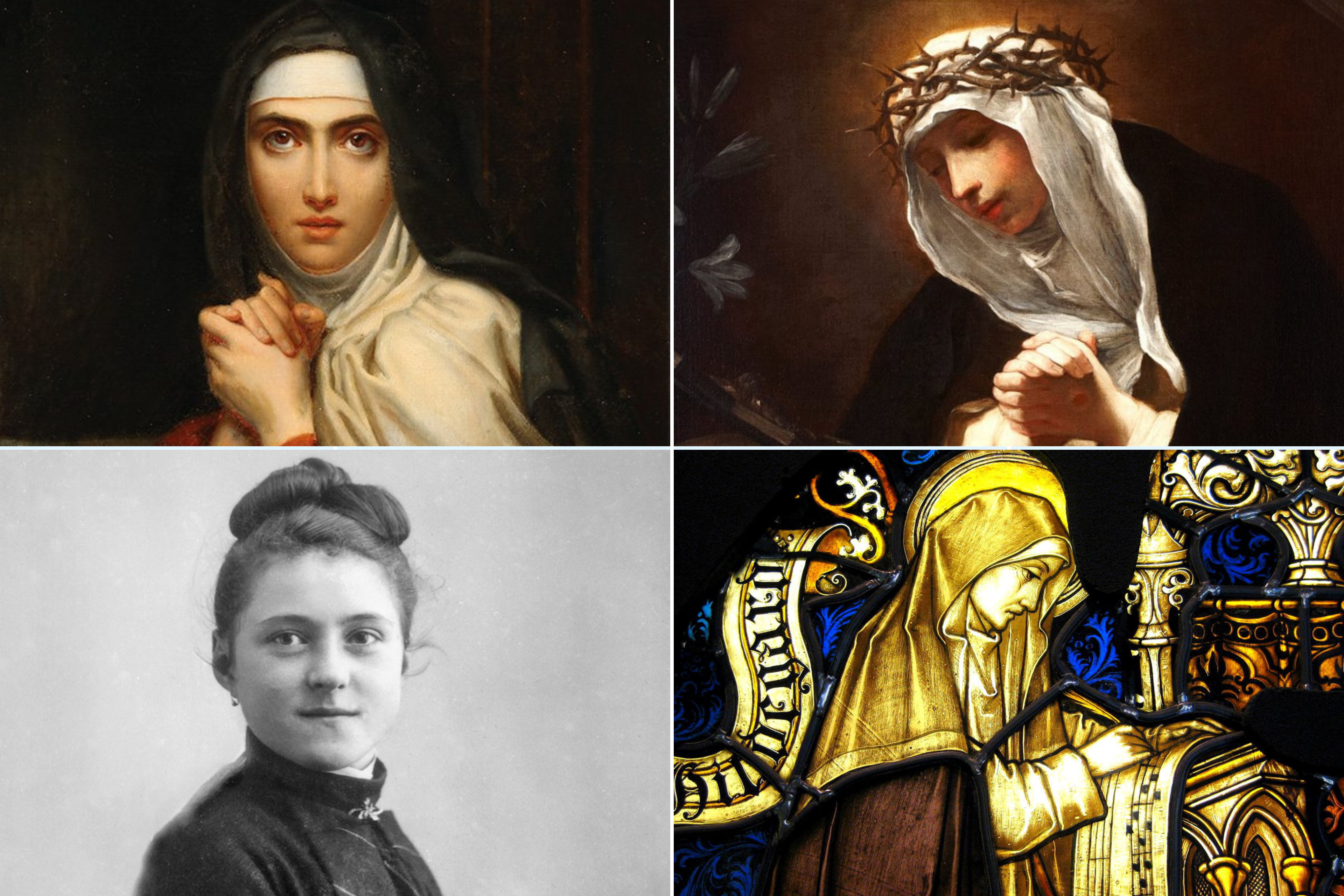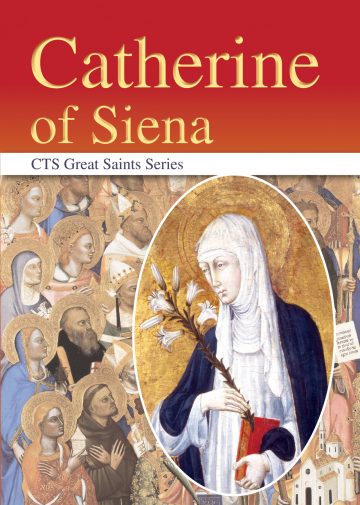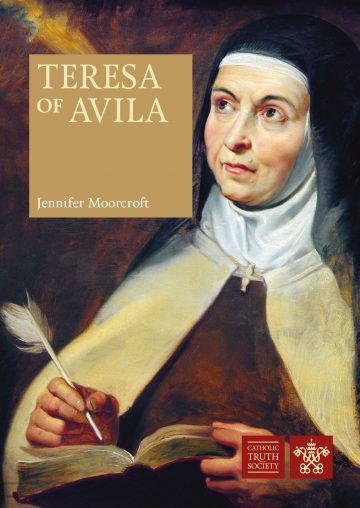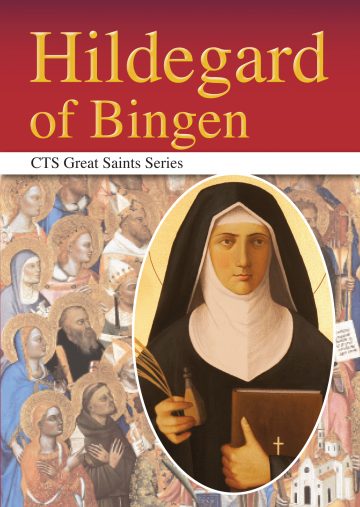The Saints are an eclectic bunch. Far from being one size fits all, they are a mix of different personalities, they lived very different lives, and while they have in common their strong faith, their gifts varied hugely. Among these saints, the Church has given some of them the title “Doctor” to 36 saints who made a significant contribution to theology or doctrine. Only four of these 36 are women, but they are nevertheless extraordinary saints who can inspire our lives today.
St Catherine of Siena
1347 – 1380 – ITALY – Feast Day: 29th APRIL

Catherine was born in Siena, Italy, in a Catholic family of cloth dyers. She was a wilful teenager and once cut off her beautiful long hair in protest at her mother trying to make her attract a husband. She was similarly adverse to life as a cloistered nun. Thus, she opted for an active and prayerful life in the lay branch or third order of the Dominicans. She promised God that she would not marry, but continued to live at home. She donned the Dominican habit, spent much time in prayer and solitude, and cared for the sick and poor. Soon she attracted a group of followers. She started to travel with them through parts of Italy, and called for the reform of the clergy. She also called people to change their lives by abandoning themselves to the love of God.
Catherine became very influential because of her deep knowledge of philosophy and theology, combined with her total dedication to God. She exchanged letters with influential friends, and even with Pope Gregory XI. She begged for peace and for the reform of the clergy.
At the time, the popes lived in Avignon, France. In 1376, Catherine was sent to Avignon as ambassador of the Republic of Florence. Her attempts to establish a peace treaty with the Papal States were unsuccessful, but she also used the opportunity to try to convince the pope to return to Rome. A year later the pope indeed changed his residence to Rome. He sent Catherine to Florence to bring about peace, which she eventually was able to do. During all her diplomatic activity she spent much time in prayer, and she had various mystical experiences. She wrote hundreds of letters, prayers, and her profoundly spiritual book The Dialogue of Divine Providence. She died when she was 33 years old.
Quote: “God is more willing to pardon than we have been to sin.”
Read more about St Catherine of Siena | This description is extracted from Online With Saints
St Teresa of Avila
1515 – 1582 – SPAIN – Feast Day: 15th OCTOBER

Teresa was born into a Spanish noble family in Avila, Spain, and grew up to be a beautiful and proud woman. She loved romance stories, nice clothes, flirting
and rebelling. When she was 16, her strict father sent her to a convent to be controlled and educated. After an initial rebellion, Teresa started to like the convent,
partly because the discipline was less strict than her father’s. When she reached a good age for marriage, she had difficulty in making up her mind. A nun’s life did not seem much fun, but marriage had not made her mother perfectly happy either. Teresa was convinced that she was a very sinful girl. She decided to enter a convent of Carmelite sisters so that she would be better protected against sin. Monastic life proved not to be very strict: her sisters, who had promised to leave their worldly lives behind and live only for Jesus, were leading a mundane life with jewellery, vanity, and many visitors. In fact, life in the convent led Teresa to pray less and less.
Some 20 years into monastic life, at the insistence of a kind priest, Teresa decided to start praying again. This was very difficult, as she encountered many distractions in her prayer, and it required great persistence. You may recognise her experience: “My mind is so wild that it seems to be like a frantic madman no one can tie down”. But eventually her persistence was rewarded. She received many graces and even visions of Jesus in her prayers. She loved him more and more and spoke very openly to him. One day she realised in prayer that she was too attached to friendships. This discovery gave her a lot of interior freedom, and while she dedicated less time to them, for her real friends she became even a better friend, without false attachments. She was a lovable person who enjoyed life and a good laugh. She loved Jesus above all.
One day, she was travelling in bad weather along a muddy stream. Her carriage got stuck and she tumbled into the water with her belongings. As she complained to Jesus, he said: ‘That’s how I treat my friends’, and she replied promptly: ‘No wonder you have so few friends.’ This made her think. Precisely because Jesus had so few friends, Teresa felt they had to be good friends. So she decided to do what she could to reform her own life, and the Carmelite order. A simple life of prayer and poverty was what she envisioned. She encountered a lot of opposition, and even inquiries by the Spanish Inquisition. But her faith was strong, and she was
convinced of the power of prayer. Part of the opposition was because other sisters did not wish to change their lavish lifestyles. But she succeeded and founded many new convents.
Quote: “To reach something good it is very useful to have gone astray, and thus acquire experience.”
Read more about St Teresa of Avila | This description is extracted from Online With Saints
St Thérèse of Lisuex
1873 – 1897 – FRANCE – Feast day: 1st OCTOBER / 8th MAY (EAST)

Thérèse Martin was born in Alençon, France, of loving and holy parents who feared for her life, as her health at birth was not good. One by one her sisters entered monastic life. Thérèse wanted to do the same, but aged 14 she was considered too young. This is when she showed her iron will. On a pilgrimage to Rome she begged the pope to let her enter the convent. When she finally was accepted in the Carmelite convent, she discovered that it was far from the romantic life she had
expected. While Thérèse realised that she was imperfect herself, she also had to suffer a lot from jealousy and pettiness of her sisters in the convent. What made her
a saint is the way in which she dealt with this. Thérèse died aged 24, after having been a Carmelite nun for almost ten years.
Thérèse was very much aware that she did not deserve God’s love and his grace. But she also wanted dearly to be close to him. She dreamt of being a great missionary, but knew that as a Carmelite sister her place was in the convent. ‘Love proves itself in deeds’ she said to herself, ‘so how can I show my love, as I cannot go out and do great deeds?’ She wrote in in her autobiography: ‘The only way I can prove my love is by scattering flowers and these flowers are every little sacrifice, every glance and word, and the doing of the least actions for love.’ Thérèse did not let herself be drowned by her feelings of badness and unworthiness. Instead, she decided to do good to others without them noticing it and to accept with joy and faith situations she could not change.
Quote: “Miss no single opportunity of making some small sacrifice, here by a smiling look, there by a kindly word; always doing the smallest right and doing it all for love.”
Read more about St Therese of Liseux | This description is extracted from Online With Saints
St Hildegard of Bingen
CA. 1098 – 1179 – GERMANY – Feast Day: 17th SEPTEMBER

Hildegard was educated by Benedictine sisters in the Rhineland, Germany. At the age of 42, she was chosen to succeed her holy teacher Jutta as abbess. This is when Hildegard’s ‘public’ life started. This truly remarkable woman had great skills in mathematics, pharmacy, medicine, philosophy, and theology, but also in music, poetry, writing, preaching, and composing, for example. Above all, she was a woman of God who dedicated herself fully to him in her religious life as a Benedictine nun. She was so close to him that she had regular visions which helped her to see daily reality in the light of God’s love. This prompted her to call on all faithful, including the clergy, to reconvert to him, and to change their lives. In spite of her poor health, she went on several preaching tours through Germany. She exchanged letters with the popes of her time. Pope Eugenius III was especially impressed by her work, and a great supporter of her writings. Because of her wisdom and knowledge, many people turned to Hildegard for advice.
“The human being exists in both the male and female form. Hildegard recognised that a relationship of reciprocity and a substantial equality between man
and woman is rooted in this ontological structure of the human condition… In Hildegard are expressed the most noble values of womanhood: hence the presence of women in the Church and in society is also illumined by her presence, both from the perspective of scientific research and that of pastoral activity. Her ability to speak to those who were far from the faith and from the Church make Hildegard a credible witness of the new evangelisation.” (Pope Benedict XVI)
Quote: “Prayer is nothing but the inhaling and exhaling of the one breath of the universe.”
Read more about St Hildegard of Bingen | This description is extracted from Online With Saints
 The descriptions of these powerful saints were extracted from Online With Saints, which offers a virtual encounter with hundreds of saints from all around the world. Women and men from all paths of life, linking their inspirational stories to real-life modern questions and providing answers.
The descriptions of these powerful saints were extracted from Online With Saints, which offers a virtual encounter with hundreds of saints from all around the world. Women and men from all paths of life, linking their inspirational stories to real-life modern questions and providing answers.
Click here to get your copy of Online With Saints and support the mission of CTS.






